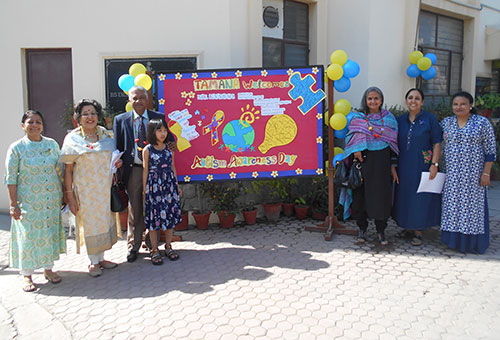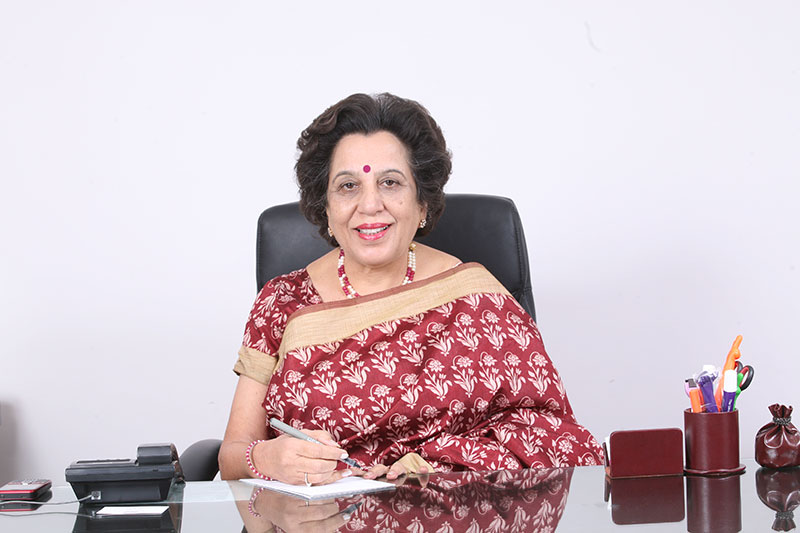Dr. Shayama Chona, founder-president of Tamana Association and former principal of Delhi Public School (DPS), RK Puram, is widely regarded as one of the most accomplished educationists in India. From academia to social service, Dr. Chona’s achievements span diverse fields. Dr. Chona is the only woman school teacher in the country who has been bestowed with both the Padma Shri (1999) and Padma Bhushan (2008) awards. Her name also finds mention in the LIMCA Book of World Records 2007 for having received the highest number of awards (53, until then). She chose to walk the difficult path to reach out to all those dealing with autism and bring a smile on their faces. Her journey is a great inspiration and a story that deserves to be told. On the occasion of World Autism Awareness Day, Dr. Chona speaks about her life’s journey with our correspondent Odeal D’Souza.
“We are here to serve those with multiple disabilities with special reference to autism. Most of them can be trained and educated through the aid of special education, skill training, therapeutic intervention, specialisation and counselling. We are delighted that Tamana has been successful in doing so,” says Dr. Chona.
Founded in 1984 in a makeshift room with three students, Tamana — a non-profit voluntary organisation has catered to thousands of individuals with intellectual and developmental disabilities through its three special education centres, Tamana Special School, Nai Disha Vocational Centre, and Tamana Autism Centre — School of Hope. Also, Tamana is the first to recognise autism as a disability distinct from the others. Tamana Autism Centre provides state-of-the-art therapeutic interventions, special and skills education and counselling to hundreds of children who do not fit into the existing special education programmes and has been recognised time and again for its outstanding work. The first centre, Tamana Special School was inaugurated by the late Royal Highness, Diana, Princess of Wales, on February 12, 1992.
However, life for Dr. Shayama Chona has not been easy since the birth of Tamana 49 years ago. For she was totally unprepared for what was going to unfurl. Chona was a happily married professional with a bubbly three-year-old son, and was really looking forward to a second child. Hoping it would be a girl, Dr. Chona and her husband, a now retired major general, decided to name their daughter Winisha. However, the world came to a standstill when her daughter (now known as) Tamana was born with multiple disabilities. Dr. Chona and her husband refused to give up.
 Dr. Chona’s motherly instinct overtook her emotions and she embarked on a journey of hope. Narrating her experience, she says, “The birth of Tamana led me to venture into the field of disability. When Tamana was born, there were hardly any centres for individuals born with special needs. I went pillar to post carrying my baby like a rag doll in my arms from school to school for admission but finally having failed in India, my journey in search of her rehabilitation took me to the United States where a special school called Esparanzo which also means Tamana accepted her. There was no looking back after that. Today Tamana is a National Awardee(2015), a Ted speaker (https://www.youtube.com/watch?v=7sPQkrGeGAk), a marathon runner and also teaches at Delhi Public School. I sincerely believe that if Tamana could do it so can all the other children with disabilities. Her rigorous routine of special therapy, multifarious activities and most importantly love and care enabled her to become what she is today and is the proof that a lot can indeed be achieved by the individuals with special needs. Tamana has finished writing her autobiography which will be out soon and she writes a daily journal which gets regularly published under the name of ‘Happify your life’. Happify is a word she coined herself; the journal is a window to her life expressing how she enjoys even the most simple pleasures,” she recalls.
Dr. Chona’s motherly instinct overtook her emotions and she embarked on a journey of hope. Narrating her experience, she says, “The birth of Tamana led me to venture into the field of disability. When Tamana was born, there were hardly any centres for individuals born with special needs. I went pillar to post carrying my baby like a rag doll in my arms from school to school for admission but finally having failed in India, my journey in search of her rehabilitation took me to the United States where a special school called Esparanzo which also means Tamana accepted her. There was no looking back after that. Today Tamana is a National Awardee(2015), a Ted speaker (https://www.youtube.com/watch?v=7sPQkrGeGAk), a marathon runner and also teaches at Delhi Public School. I sincerely believe that if Tamana could do it so can all the other children with disabilities. Her rigorous routine of special therapy, multifarious activities and most importantly love and care enabled her to become what she is today and is the proof that a lot can indeed be achieved by the individuals with special needs. Tamana has finished writing her autobiography which will be out soon and she writes a daily journal which gets regularly published under the name of ‘Happify your life’. Happify is a word she coined herself; the journal is a window to her life expressing how she enjoys even the most simple pleasures,” she recalls.
Although Dr. Chona sometimes worries about how Tamana will cope after she is gone, she abruptly dismisses the thought since she knows that Tamana has a really big support system in her brother and his family. Dr. Chona adds, “The journey is tough, but the parents need to be strong willed and determined to transform the lives of their children. Their determination is their hope. Do not give up on them. The autistic children can perform miracles with the right interventions and social settings.”
At the outset, the major challenge that stood in Dr. Chona’s way was dealing with people’s ignorance and attitude towards autism when it was not yet an identifiable condition. It was difficult to convince people that autism is not a disease but a condition of life which is not infectious and your Karma has nothing to do with it. “Though the perception is slowly changing now, we need more active participation of parents, schools and media to showcase success stories which can be instrumental in giving hope and help in changing the prevailing perceptions. Also, our country requires better training institutes for special educators, therapists and counsellors. Every regular school should be connected with a special centre so that the socialisation needs can be fulfilled at the regular school and the therapeutic requirements at the special centre,” she adds.
“Our greatest fear is if we do not teach the autistic to express themselves then they may unknowingly roll in pain or not have the ability to let the family know they are hungry or thirsty. The autistic cannot differentiate between animate and inanimate, they fear eye contact, they are hyper-kinetic, they babble as they have limited speech and have a tendency to run away here and there. To break the barriers of aloofness and get them into the world of other people is a big challenge which needs careful handling. They can slap you or pull your hair, but so what, if these beatings can finally help them fit into the mainstream society, it is worth it.”
Surprisingly, autistic individuals are ICT friendly. The computer is their friend because they can command it and there is no one-to-one human interaction required. It is amazing what they can do with a computer, tablet or iPad, their capabilities and handling of the machine can surpass that of most individuals. Though in order to integrate them in the corporates, a lot of sensitisation is required to ensure that they are comfortable in the work environment. So the parents should be patient and give them a lot of love and support,” Dr. Chona concludes.
Today, Dr. Chona feels blessed and is happy with her life’s journey. Every moment of her life with Tamana has been full of learning. She adds, “I will consider myself really successful if I can change the attitude of our society towards the differently abled. On the occasion of ‘World Autism Awareness Day’ we have taken a pledge from thousands of children from leading regular schools and hundreds of school principals to include and integrate autistic individuals in their schools.”
Tamana is organising its 4th international conference with the aim of developing a road map for the inclusion of autistic individuals in the society and sensitising key stakeholders. Scheduled from January 10-12, 2020 at Lotus Valley International School, Gurgaon, this conference is a part of the NGO’s continuing quest for a better life for people with autism and their families in India and through it, hopes to address the issues of inclusion of children and adults dealing with autism.
Posted in National























